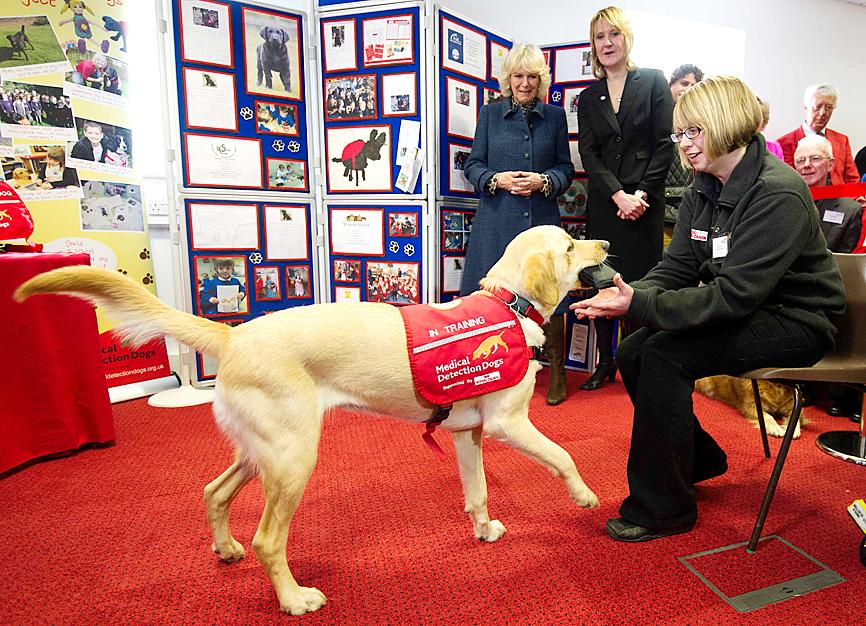A British charity has teamed up with scientists to see whether dogs could help detect COVID-19 through their keen sense of smell, it said yesterday.
Medical Detection Dogs is to work with the London School of Hygiene and Tropical Medicine and Durham University in northeast England to determine whether canines could help with diagnoses.
It follows previous research into dogs’ ability to sniff out malaria and is based on a belief that each disease triggers a distinct odor.

Photo: AFP
The organizations said that they had begun preparations to train dogs in six weeks “to help provide a rapid, non-invasive diagnosis towards the tail end of the epidemic.”
The charity has previously trained dogs to detect diseases such as cancer, Parkinson’s and bacterial infections by sniffing samples taken from patients.
They can also detect subtle changes in skin temperature, potentially making them useful to determining whether a person has a fever.
“In principle, we’re sure that dogs could detect COVID-19,” Medical Detection Dogs founder and chief executive Claire Guest said.
“We are now looking into how we can safely catch the odor of the virus from patients and present it to the dogs,” Guest said. “The aim is that dogs will be able to screen anyone, including those who are asymptomatic, and tell us whether they need to be tested.”
“This would be fast, effective and non-invasive and make sure the limited NHS [British National Health Service] testing resources are only used where they are really needed,” she said.
The head of disease control at the London School of Hygiene and Tropical Medicine said that dogs could detect malaria with “extremely high accuracy” and, as other respiratory diseases changed body odor, there was a “very high chance” it could also work with COVID-19.
Detection dogs could be deployed at airports at the end of the epidemic to rapidly identify people carrying the virus, helping prevent the re-emergence of the disease, Steve Lindsay from Durham University said.
Nearly half of China’s major cities are suffering “moderate to severe” levels of subsidence, putting millions of people at risk of flooding, especially as sea levels rise, according to a study of nationwide satellite data released yesterday. The authors of the paper, published by the journal Science, found that 45 percent of China’s urban land was sinking faster than 3mm per year, with 16 percent at more than 10mm per year, driven not only by declining water tables, but also the sheer weight of the built environment. With China’s urban population already in excess of 900 million people, “even a small portion

UNSETTLING IMAGES: The scene took place in front of TV crews covering the Trump trial, with a CNN anchor calling it an ‘emotional and unbelievably disturbing moment’ A man who doused himself in an accelerant and set himself on fire outside the courthouse where former US president Donald Trump is on trial has died, police said yesterday. The New York City Police Department (NYPD) said the man was declared dead by staff at an area hospital. The man was in Collect Pond Park at about 1:30pm on Friday when he took out pamphlets espousing conspiracy theories, tossed them around, then doused himself in an accelerant and set himself on fire, officials and witnesses said. A large number of police officers were nearby when it happened. Some officers and bystanders rushed

Beijing is continuing to commit genocide and crimes against humanity against Uyghurs and other Muslim minorities in its western Xinjiang province, U.S. Secretary of State Antony Blinken said in a report published on Monday, ahead of his planned visit to China this week. The State Department’s annual human rights report, which documents abuses recorded all over the world during the previous calendar year, repeated language from previous years on the treatment of Muslims in Xinjiang, but the publication raises the issue ahead of delicate talks, including on the war in Ukraine and global trade, between the top U.S. diplomat and Chinese

HYPOCRISY? The Chinese Ministry of Foreign Affairs yesterday asked whether Biden was talking about China or the US when he used the word ‘xenophobic’ US President Joe Biden on Wednesday called for a hike in steel tariffs on China, accusing Beijing of cheating as he spoke at a campaign event in Pennsylvania. Biden accused China of xenophobia, too, in a speech to union members in Pittsburgh. “They’re not competing, they’re cheating. They’re cheating and we’ve seen the damage here in America,” Biden said. Chinese steel companies “don’t need to worry about making a profit because the Chinese government is subsidizing them so heavily,” he said. Biden said he had called for the US Trade Representative to triple the tariff rates for Chinese steel and aluminum if Beijing was